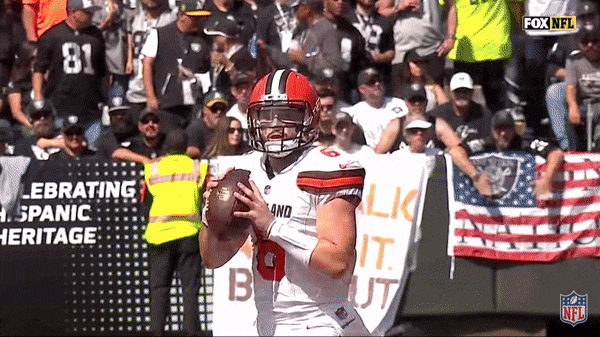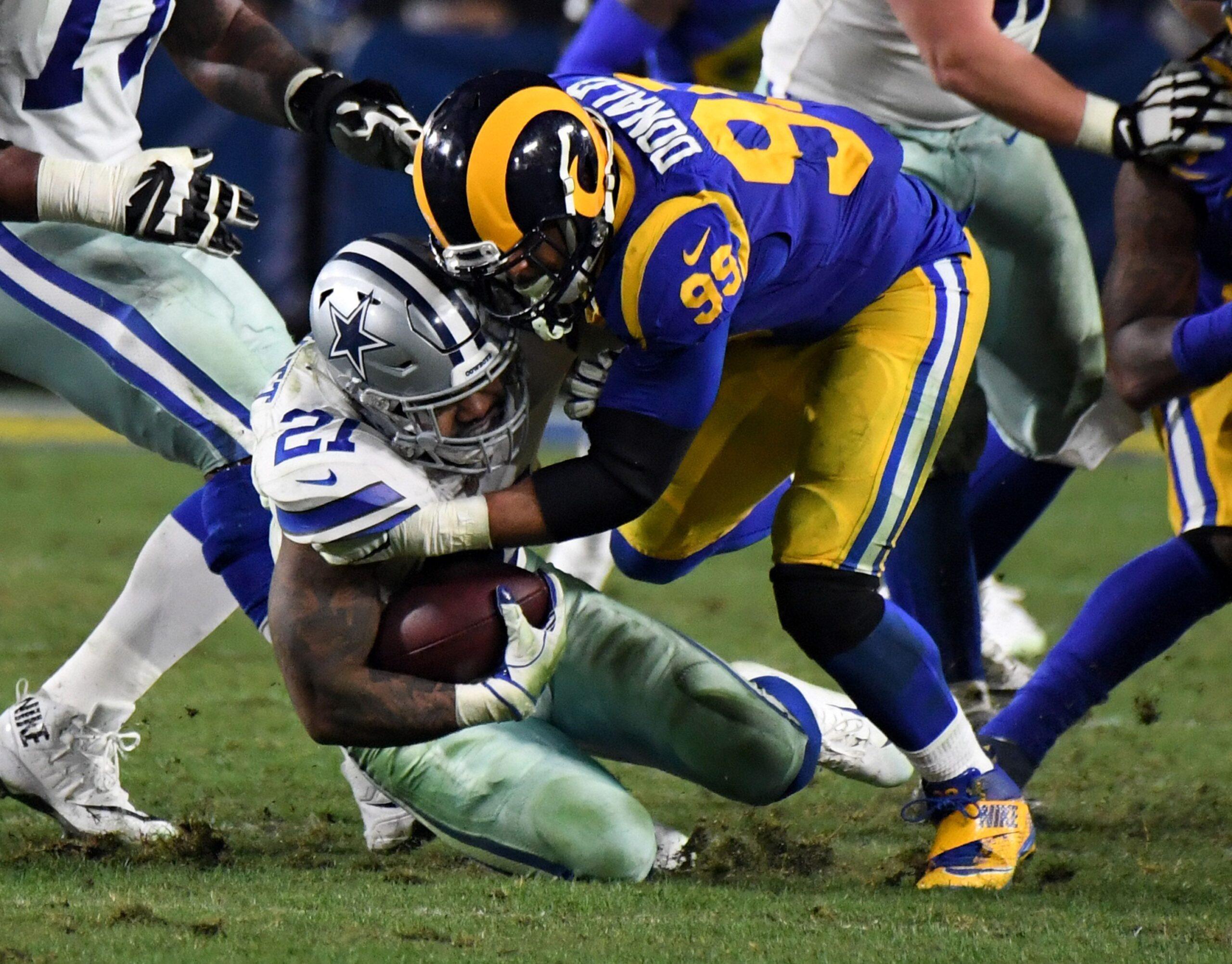Coaching matchups don’t get much better than the ones in this year’s Super Bowl. The talk leading up to Sunday’s game has focused on the battle between aging sorcerer Bill Belichick and stubbled wunderkind Sean McVay, and it looks to be worth every bit of hype. Thinking about the methods Belichick will use to try to stop the Rams’ unique offense is a fascinating thought experiment—and that’s before even getting to the ways that McVay could counter. What makes this Super Bowl truly incredible, though, is that the clash of great minds isn’t limited to one set of offenses and defenses. In Patriots offensive coordinator Josh McDaniels and Rams defensive coordinator Wade Phillips, we’ll get to watch two of the NFL’s best square off on the sport’s biggest stage. So to break down Super Bowl LIII, let’s take a look at how these four masterminds will aim to outsmart one another. Then let’s offer a prediction for how things will unfold.
Sean McVay’s Offense vs. Bill Belichick’s Defense
Where to even begin? McVay’s offense is unlike any other in football. The Rams take concepts that nearly every team in the league uses and push them to the extreme. No other NFL team ran jet motion more often this season. No other team used 11 personnel on a higher percentage of its snaps. No other team deployed play-action on a higher percentage of its dropbacks. And no other team uses more tight receiver splits and stacked receiver sets.
Earlier this week, Patriots cornerbacks coach Josh Boyer told me that New England has seen examples of every aspect of the Rams offense this season. The difference is that with McVay, those quirks aren’t scattered throughout a game plan. They are the game plan. And considering many of his tactics are specifically designed to take advantage of a single lazy moment from an unwitting defender, vigilance is paramount for a defense playing the Rams.
Let’s start with the motion. The Rams use this to continually confuse the defense, and in turn generate big gains. On one play against the Saints in last month’s NFC title game, Los Angeles managed to turn a trips alignment on the right side of the formation into a trips alignment on the left before the ball was snapped. During the play, linebacker Demario Davis wound up covering wide receiver Josh Reynolds, and the result was a 33-yard gain that set up a game-tying field goal midway through the fourth quarter.

The Rams will occasionally use their jet-motion concepts to hand the ball off to a receiver streaking across the formation, but for the most part those movements are designed to toy with a defender’s eyes and to recalibrate defensive assignments. McVay’s success is predicated on disrupting the defense’s rules. Belichick’s job will be making sure that his defenders don’t let the bells and whistles of L.A.’s system distract them from focusing on what McVay actually wants to accomplish.
That boils down to gashing teams in the run game and parlaying that success into quarterback Jared Goff taking play-action shots downfield. More often than not, defenses respond to the Rams offense with nickel personnel packages, with the goal of slowing the three wide receivers (Brandin Cooks, Robert Woods, and Reynolds) that L.A. uses on the vast majority of its plays. With smaller defenders on the field and fewer players crowding the box, the Rams are able to lean on backs Todd Gurley, C.J. Anderson, and their running game for efficient gains. Look no further than the Rams’ divisional-round victory over the Cowboys, in which they rushed for a staggering 273 yards with three touchdowns.
New England’s greatest strength on the back end of its defense is flexibility. With Devin McCourty, Patrick Chung, and Duron Harmon, the Pats have three capable safeties who can be used in any situation. They also have a solid trio of covermen at cornerback: Jason McCourty, Stephon Gilmore, and rookie J.C. Jackson. The problem for the Patriots is that if they put all of those defensive backs on the field at once, with Chung acting as a de facto linebacker, then New England could be susceptible to the Rams’ excellent ground game. In the regular season, Gurley faced boxes of eight or more defenders on just 8.2 percent of his carries, the third-lowest rate in the league. I wouldn’t be surprised if Belichick was content to allow the Rams to have some success on the ground to limit the effects of their devastating play-action game. If the Rams start to move the ball efficiently when they run, it’ll be up to McVay to stick with that approach and not chase chunk plays through the air.
Saying that Gurley will be one of the Rams’ key components in this game may not sound revelatory, but we’re only two weeks removed from him being a nonfactor in the NFC championship. And the Pats are significantly better at stopping interior runs than they are at slowing down backs on the perimeter. How Gurley fares against the Pats’ lighter outside packages will have a massive impact on the Rams offense. His involvement in the passing game may also be more crucial than at any previous point this season. New England employs press man coverage more than any team in football. The Patriots corners will almost certainly spend Sunday night manhandling the Rams receivers and staying glued to their hips. The best way for McVay to make them pay is by using Gurley in the slot and forcing bigger linebackers, like Kyle Van Noy and Dont’a Hightower, to stick with him in space. These are the sort of cat-and-mouse tactics that could swing the matchup.
Josh McDaniels’s Offense vs. Wade Phillips’s Defense
Unlike the clash between Belichick and McVay, we’ve seen these two square off before. Phillips came away with the win. The legendary coordinator led the Broncos defense when Denver knocked off New England 20-18 in the AFC championship game following the 2015 season, and I fully expect the Rams to implement an approach similar to the one that Phillips used with Von Miller, DeMarcus Ware, and his former No Fly Zone secondary.
That may sound simple, but in many ways Phillips’s defense is simple. For the most part, he runs the same system that he’s used since entering the league more than 40 years ago. In the modern NFL, that means more four-man fronts (in what’s technically a 3-4 base defense), yet the basis of his approach has remained consistent. The key has always been the subtle adjustments Phillips makes for his opponent and his personnel. Against the Patriots three seasons ago, Phillips was willing to call for much more zone coverage than he typically does. The goal was to provide Tom Brady with as little presnap information as possible by deploying a mix of coverage types throughout the game. Phillips combined those coverages with a variety of alignments up front. The Broncos almost never blitzed, and the Rams likely won’t bring extra pressure Sunday. Instead, they’ll probably put five or six defenders along the line of scrimmage and do all they can to make Brady second-guess which four are coming.
For defenses facing Brady, even the tiniest hesitations can mean everything. Over two playoff games this season, Brady has yet to be sacked. During last month’s AFC championship game win in Kansas City, he was barely even touched. Brady’s average time to throw during the postseason has been an absurd 2.18 seconds. He’s gotten rid of the ball in less than two seconds on 67.8 percent of his dropbacks, according to Pro Football Focus, and has completed 77 percent of those throws. The less information Brady can discern before the snap, the more likely it is that he’ll have to hang on to the ball just a bit longer. That’s where Aaron Donald comes in.

It’s no secret that interior pressure always has been the most important ingredient to slowing down Brady. His passer rating when pressured up the middle this season was just 63.1. The Rams just so happen to have the best interior rusher—and defensive player, period—in football. How the Pats plan to contain Donald, and how the Rams react as a result, might be the most important aspect of this game. New England will almost certainly slide its protection toward Donald as often as possible, which should leave one-on-one matchups across the rest of the defensive line. As The Ringer’s Danny Kelly pointed out this week, Ndamukong Suh could be vital to the Rams’ success. If he can take advantage of either New England guard Joe Thuney or Shaq Mason, it could spell a long evening for Brady.
The Patriots’ focus on Donald should do more than facilitate one-on-one matchups for the rest of the Rams’ defensive front, though. It should also create space. With fewer blockers accounting for the non-Donald players, there should be more room for L.A. defenders to twist and stunt than there otherwise would be. Don’t be surprised if the Rams try to get Dante Fowler Jr. and others free up the middle as a result. Interior pressure doesn’t have to come from a team’s defensive tackles. Rob Gronkowski hadn’t found much success as a receiver this season before the AFC title game, but he’s continued to be a dominant blocker. It might serve the Pats well to keep him in tight as an extra line of protection against the Rams pass rush.
To keep the Rams off balance, expect McDaniels to dial up a ton of motion, especially from New England’s running backs. By moving someone like Rex Burkhead around before the snap, McDaniels can help Brady gather some of the information that Phillips is trying to take away by mixing his man- and zone-coverage looks. And the problem for the Rams, if the pass rush fails to generate consistent pressure, is that New England has answers for every coverage type. The Patriots torched the Chiefs’ man-heavy looks with receiver stacks used to generate quick separation, and we’ll see those again if the Rams choose to play a lot of man. If Phillips leans toward more zone, Julian Edelman and James White could feast over the middle as Brady marches from end zone to end zone. White should be a focal point of the Rams’ game plan on Sunday. Saints running back Alvin Kamara was the only New Orleans pass catcher who got much done against the Rams in the NFC championship game, and it seems like White could find similar success against a linebacking corps that’s regularly struggled in space.
Sony Michel and the Patriots ground game should also have a say before all is said and done. While the Rams were 28th in Football Outsiders’ rushing DVOA during the regular season, they’ve been excellent at stopping the run during these playoffs. Yet if the Rams choose to bring extra defenders into the box to limit the Patriots ground game out of heavy two-back sets, that could afford Brady the chance to slice and dice them through the air. I know this may come as a surprise, but stopping the greatest quarterback in NFL history is rarely easy.
The Pick
Donald and the pass rush will get to Brady just enough, and Gurley will tally more than 150 yards of total offense. Greg Zuerlein will hit a 44-yard field goal as time expires.
Rams 24, Patriots 21